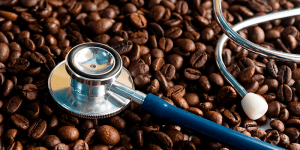El efecto del consumo de café en el desarrollo de carcinoma hepatocelular en zona endémica del virus de la hepatitis B
27-04-2017
Un estudio de casos y controles se adelantó con el objetivo de explorar la relación entre consumo de café durante toda la vida y el riesgo de desarrollo de carcinoma hepatocelular (CHC) considerando el estatus de replicación del virus de la hepatitis B (VHB), en una región endémica. Se incluyeron 1364 sujetos de los cuales 258 presentaron CHC (casos), 480 pacientes sanos (controles 1) y 626 pacientes con enfermedad hepática crónica diferente a CHC (controles 2). Se aplicó un instrumento estandarizado que exploró variables como el hábito de fumar, beber alcohol y consumo de café. También se adelantó una medición de niveles de antígeno-e del VHB (HBeAg) y ADN del VHB en el suero de pacientes infectados por el VHB. Se aplicó un modelo de regresión logística multivariable ajustada por edad, género, obesidad, antecedente de Diabetes Mellitus, tabaquismo, consumo de alcohol y consumo de café. Para el caso de los controles 2, la etiología viral de la enfermedad hepática crónica también fue incluida como covariable. Después de ajustar por estas variables se evidenció que un alto consumo de café durante toda la vida (>= 20 000 tazas) resultó asociado inversamente con CHC. Lo anterior aplicó para cada análisis utilizando grupos de control sanos y a riesgo respectivamente (el grupo sano, OR 0.56, IC 95% 0.33-0.95; grupo enfermedad hepática crónica OR 0.55, CI 95% 0.36-0.85). Sin embargo, el alto consumo de café no afectó el riesgo de CHC en pacientes con VHB (OR 0.64, CI 95% 0.36-1.14) después de ajustar por el estado de HBeAg, el nivel de ADN de HBV en suero y la terapia antiviral. En conclusión, en este estudio se evidenció que un alto consumo de café en toda la vida está inversamente asociado al desarrollo de CHC.
Jang ES, Jeong SH, Lee SH, Hwang SH, Ahn SY, Lee J, Park YS, Hwang JH, Kim JW, Kim N, Lee DH, Kim HY. The effect of coffee consumption on the development of hepatocellular carcinoma in hepatitis B virus endemic area. Liver Int 2013, 33(7):1092-9
1. Ferlay J, Shin H-R, Bray F, et al. Estimates of worldwide burden of cancer in 2008: GLOBOCAN 2008. Int J Cancer 2010; 127: 2893–917.
2. Schutte K, Bornschein J, Malfertheiner P. Hepatocellular carcinoma-epidemiological trends and risk factors. Dig Dis 2009; 27: 80–92.
3. Kwon OS, Jung YK, Kim YS, et al. Effect of alcohol on the development of hepatocellular carcinoma in patients with hepatitis B virus-related cirrhosis: a cross-sectional casecontrol study. Korean J Hepatol 2010; 16: 308–14.
4. Ryu SH. Interaction between viral hepatitis and environmental risk factors in pathogenesis of hepatocellular carcinoma. Korean J Hepatol 2008; 14(5 Suppl.): 16.
5. Klatsky AL, Morton C, Udaltsova N, Friedman GD. Coffee, cirrhosis, and transaminase enzymes. Arch Intern Med 2006; 166: 1190–5.
6. Ruhl CE, Everhart JE. Coffee and caffeine consumption reduce the risk of elevated serum alanine aminotransferase activity in the United States. Gastroenterology 2005; 128: 24–32.
7. Gallus S, Tavani A, Negri E, La Vecchia C. Does coffee protect against liver cirrhosis? Ann Epidemiol 2002; 12: 202–5.
8. Adami HO, Hsing AW, McLaughlin JK, et al. Alcoholism and liver cirrhosis in the etiology of primary liver cancer. Int J Cancer 1992; 51: 898–902.
9. Bravi F, Bosetti C, Tavani A, La Vecchia C. Coffee drinking and hepatocellular carcinoma: an update. Hepatology 2009; 50: 1317–8.
10. Johnson S, Koh WP, Wang R, et al. Coffee consumption and reduced risk of hepatocellular carcinoma: findings from the Singapore Chinese Health Study. Cancer Causes Control 2011; 22: 503–10.
11. Bruix J, Sherman M. Management of hepatocellular carcinoma: an update. Hepatology 2011; 53: 1020–2.
12. Sherman M, Peltekian KM, Lee C. Screening for hepatocellular carcinoma in chronic carriers of hepatitis B virus: incidence and prevalence of hepatocellular carcinoma in a North American urban population. Hepatology 1995; 22: 432–8.
13. Gallus S, Bertuzzi M, Tavani A, et al. Does coffee protect against hepatocellular carcinoma? Br J Cancer 2002; 87: 956–9.
14. Kurozawa Y, Ogimoto I, Shibata A, et al. Coffee and risk of death from hepatocellular carcinoma in a large cohort study in Japan. Br J Cancer 2005; 93: 607–10.
15. Shimazu T, Tsubono Y, Kuriyama S, et al. Coffee consumption and the risk of primary liver cancer: pooled analysis of two prospective studies in Japan. Int J Cancer 2005; 116: 150–4.
16. Ohfuji S, Fukushima W, Tanaka T, et al. Coffee consumption and reduced risk of hepatocellular carcinoma among patients with chronic type C liver disease: a case-control study. Hepatol Res 2006; 36: 201–8.
17. Gelatti U, Covolo L, Franceschini M, et al. Coffee consumption reduces the risk of hepatocellular carcinoma independently of its aetiology: a case-control study. J Hepatol
2005; 42: 528–34.
18. Inoue M, Kurahashi N, Iwasaki M, et al. Effect of coffee and green tea consumption on the risk of liver cancer: cohort analysis by hepatitis virus infection status. Cancer Epidemiol Biomarkers Prev 2009; 18: 1746–53.
19. Montella M, Polesel J, La Vecchia C, et al. Coffee and tea consumption and risk of hepatocellular carcinoma in Italy. Int J Cancer 2007; 120: 1555–9.
20. Yang HI, Lu SN, Liaw YF, et al. Hepatitis B e antigen and the risk of hepatocellular carcinoma. N Engl J Med 2002; 347: 168–74.
21. Chen CJ, Yang HI, Su J, et al. Risk of hepatocellular carcinoma across a biological gradient of serum hepatitis B virus DNA level. JAMA 2006; 295: 65–73.
22. WHO, International Association for the Study of Obesity, International Obesity Task Force. The Asia-Pacific Perspective: Redefining Obesity and Its Treatment. Sydney: Health Communications Australia Pty, 2000.
23. Hu G, Tuomilehto J, Pukkala E, et al. Joint effects of coffee consumption and serum gamma-glutamyltransferase on the risk of liver cancer. Hepatology 2008; 48: 129–36.
24. Inoue M, Yoshimi I, Sobue T, Tsugane S. Influence of coffee drinking on subsequent risk of hepatocellular carcinoma: a prospective study in Japan. J Natl Cancer Inst 2005; 97: 293–300.
25. Bravi F, Bosetti C, Tavani A, et al. Coffee drinking and hepatocellular carcinoma risk: a meta-analysis. Hepatology 2007; 46: 430–5.
26. Larsson SC, Wolk A. Coffee consumption and risk of liver cancer: a meta-analysis. Gastroenterology 2007;132: 1740–5.
27. Wakai K, Kurozawa Y, Shibata A, et al. Liver cancer risk, coffee, and hepatitis C virus infection: a nested case-control study in Japan. Br J Cancer 2007; 97: 426–8.
28. Fujinaga H, Tsutsumi T, Yotsuyanagi H, Moriya K, Koike K. Hepatocarcinogenesis in hepatitis C: HCV shrewdly exacerbates oxidative stress by modulating both production and scavenging of reactive oxygen species.Oncology 2011; 81(Suppl. 1): 11–7.
29. Fung J, Lai CL, Yuen MF. Hepatitis B and C virus-related carcinogenesis. Clin Microbiol Infect 2009; 15: 964–70.
30. Lee KJ, Choi JH, Jeong HG. Hepatoprotective and antioxidant effects of the coffee diterpenes kahweol and cafestol on carbon tetrachloride-induced liver damage in mice. Food Chem Toxicol 2007; 45: 2118–25.
31. Kuper H, Tzonou A, Kaklamani E, et al. Tobacco smoking, alcohol consumption and their interaction in the causation of hepatocellular carcinoma. Int J Cancer 2000; 85: 498–502.
32. Coughlin SS. Recall bias in epidemiologic studies. J Clin Epidemiol 1990; 43: 87–91.
33. Sackett DL. Bias in analytic research. J Chronic Dis 1979; 51–63.















